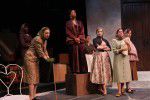‘Medea’ kicks off spring semester in Vasey Theatre

February 3, 2010
“There is some gnarly stuff in this show that [audience members] have not seen on stage before,” Kimberly Fairbanks says.
Fairbanks, a petite woman with a pixie cut, is a first-year masters in theatre graduate student. She speaks thoughtfully, conveying the impression that she is intensely connected to her role as Medea in the Vasey production of the Greek tragedy “Medea,” which opened Tuesday night.
“Every role that I’ve played has been vastly different from Medea,” Fairbanks says. “Because Medea is so complex, I think every role I’ve ever played plays a part in finding out what makes her tick. She feels everything to an extreme. I hope I’ve done my job well enough that I can convey this to an audience.”
What makes this character so unique? The play “Medea” is based on the Greek myth of Jason and Medea, in which Medea is estranged from her husband as he leaves her for another wife. She is tortured by her husband’s alienation, and concludes the play by acting out an unimaginable calculation of logic.
This is the point where the “gnarly stuff” happens — a bold transgression from the minimalist plots of traditional Greek theater. While the violence and tragedy happens offstage in Euripides’ original text, Vasey puts the action on stage.
“Medea” has been performed in theaters since the time of Euripides, a great tragedian of ancient Athens. It won third place at the Dionysia festival, a religious festival featuring theatrical performances in 431 B.C.
In modern times, “Medea” still appeals to audiences, actors and directors, and it has been performed in a range of adaptations and interpretations.
Villanova’s production, directed by Shawn Kairschner, assistant professor of theater, is set in the seaside town of Corinth, Greece, during the 1960s. Fairbanks relates the appearance to something from the television series “Madmen.”
“I think the central theme of ‘Medea’ is that men and women live in separate spheres, and there is no communication,” Kairschner says. “The gender division was so much more precise in Greek times. The 1960s, to me, was the last recognizable moment where that tension was recognized in the same way.”
In order to emphasize the timelessness of the play, Kairschner has decided on a translation of “Medea” by Robin Robertson, published in 2008. The script uses contemporary and lucid language to convey that, although the language of Greek tragedy has changed, the issues have not.
Kairschner also intends to breathe humanity into the audience’s perception of Medea.
“One of my goals is to show that Medea is not a monster but a human,” Kairschner says. “She’s a very complex and multi-valanced character. When the killing is backstage, we can’t see how hard it is for Medea to do it.”
Kairschner has also transformed the traditional Greek chorus into a complex character as well. Each of the actresses in the chorus has her own personality and interacts with the action of the play in a unique way.
Instead of acting as mediator between play and audience, the chorus extracts more of the complicated issues latent in Medea’s predicament.
Fairbanks, who has only seen dance interpretations of “Medea,” takes Kairschner’s approach to heart.
“What I think is really interesting is that Villanova’s production of ‘Medea’ is looking at her in a very different light than most people are used to seeing her,” Fairbanks says.”Through this production, maybe they’ll see there is a method to her madness — that it isn’t just this crazy thing, and understanding why she felt she was driven to this. All of this is based on a promise, and I think that’s very poignant.”
In her interpretation of Medea, Fairbanks attempts to unearth the human emotions that drive this doomed character to act on her unnatural desires for herself and her audience.
“I am showing vulnerability in Medea, allowing the audience to see not just a wrath in this woman, but the humanity — that we are not just one thing. We are multifaceted,” Fairbanks says.
Fairbanks invites the audience to relate to the ordeals Medea faces.
“Everyone can relate to Medea because everyone has loved, lost, been betrayed, gone above and beyond for someone and had that thrown back in his or her face. Everyone has felt like an outsider, and everyone, at the end of the day just wants to be loved.”











